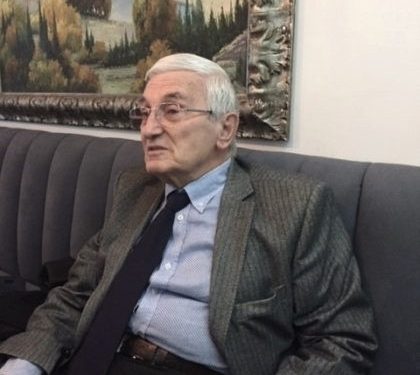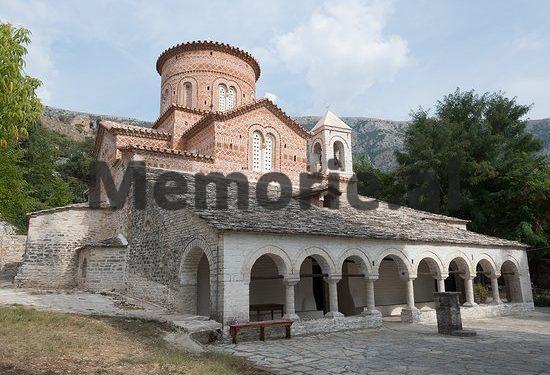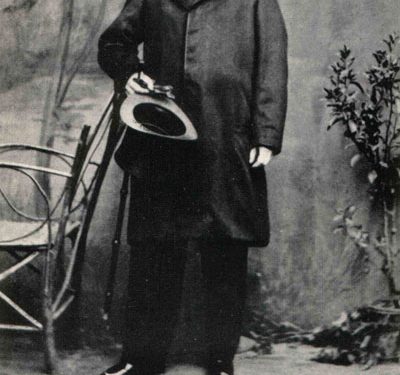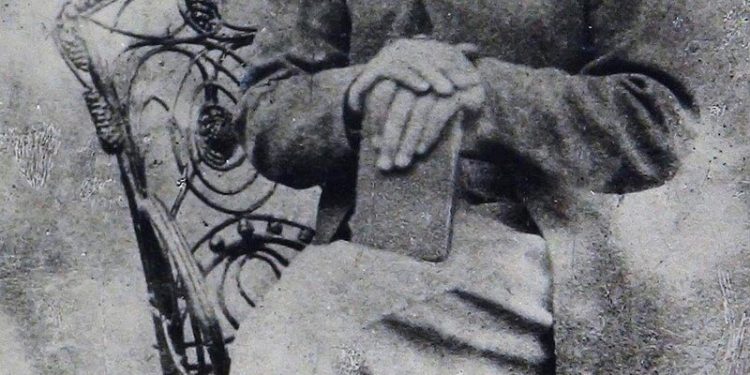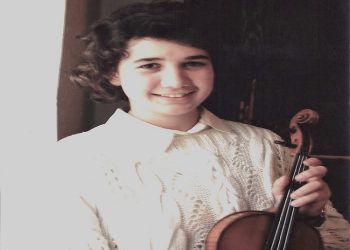By Prof. Dr. Fedhon Meksi
Memorie.al / Chronologically and not only, after Dr. Vangjel Meksi (1770 – 1823), one of the doctors of Ali Pasha Tepelena, the first translator of the “New Testament” (1821), “the most important Albanian writer of the beginning of the 19th century”, says “…Apostol Meksi, also this doctor, who, together with Konstandin Kristoforidhin, gave the first Albanian lessons to the albanologist Johannes Georg von Hahn (1811-1869) and collected a part of the Tuscan folklore, which was published in “Albanesische Studien” (Albanian Studies) (Dhimitër Shuteriqi – Writings Albanian in the years 1832-1850, Tirana 1965). Reading the few writings that existed about Dr. Apostle Meksin, I was convinced that it had been overlooked. From documents that have long existed in libraries, it could easily be proven that Dr. Apostol Meksi, in fact, was a great Albanian patriot, even one of the first, if not the first Albanian folklorist and deserved to be studied seriously.
After learning Albanian, Hahn realized that Albanians spoke Illyrian
Apostol Meksi was only a student at the “Zosimea” high school in Ioannina, when he gave his first Albanian lessons to the deputy consul of Austria-Hungary in that city, and then a newly graduated doctor temporarily abandoned his profession and accompanied him on a scientific expedition to Albania. South and Middle, to collect the riches of our folklore. Hahn published his observations and conclusions in the work “Albanian Studies”, Jena 1854, I, II, III, which is known as one of the most valuable scientific works on Albanian history, language and culture.
Volume I deals with Albanian popular culture, while volumes II-III are entirely devoted to language issues and especially to the origin of Albanians and Albanians. He explained many Illyrian toponyms through Albanian and proved that many place names of Albanian villages were a direct continuation of Illyrian names. Hahni also discovered some Illyrian word-formation tools that lived on in Albanian names. Arriving at the conclusion that Albanian is a direct continuation of one of the old dialects of Illyrian, he thus became a staunch defender of the autochthony of Albanians. Hahn’s conclusions served our revivalists to support their demands for the recognition of the Albanian people as a separate people, with a separate historical path.
Albanologist Hahn is a colossus, what about “his teacher”?
In formulating these conclusions with invaluable values for our national issue, Dr. Apostle Meksi, has given his important contribution. Apostle Meksi was born in Labovo in 1825 and as he himself writes in; “Albanian Studies”, is the son of Jorgji, the grandson of Panajoti from the Meksi (Meksataj) branch of the Doda tribe. After completing primary school in Labovo, he enrolled in the “Zosimea” gymnasium in Ioannina. Together with Konstandin Kristoforidhi, with whom he had formed a close friendship, he gave the first lessons of Albanian to the future Albanologist, Hahn.
In fact, Hahn was in Greece years ago and practiced as a judge.
During this time he gets to know many Arvanitas and is closely related to them. After finishing high school, Apostol Meksi enrolled in the Faculty of Medicine of the University of Athens. It is not known whether he continued his relationship with Hahn during his university years, but it is known for sure that starting after graduation, they prepared together the first folklore expedition that would start from Janina, Delvina, Gjirokastra, Vlora, Labova and continue in Kavajë, Peqin, Elbasan, Petrelë, Tirana and throughout Western Albania, up to Shkodër.
Their friendship was close, sincere and based on mutual respect. In the first volume of “Albanian Studies”, Hahn calls the Apostle; “my teacher” and textually: “My teacher, Apostoli, is persistent, with a strong character and experienced in life, just like all the residents of Rëza”. Apostol Meksi was among the first Albanian patriotic intellectuals, who was recycled into a folklorist to collect, process and present the Albanian folklore heritage, in order to show the world that Albanians differed from Greeks and Vlachs, not only by history, language, etc. ., but also from the way of life, customs, songs, dances, etc.
In the first volume of “Albanian Studies”, about 15% of the written material belongs to Dr. Apostle Meksit, that is, they are written by him. These chapters are preceded by an introduction written by Hahn, which we present verbatim:
“My teacher Apostoli, for a long time had told me what he knew about the customs of Rrëza province and especially of his village, Labovo.
However, the Apostle once again asked the elders about specific matters in order to obtain accurate information from several sources. Afterwards, the Apostle handed me the material, divided into several chapters, that he had written in Greek, which, after we checked it together once again, I translated (in German), making only a few minor corrections.
This method, really complicated, turned out to be especially correct to give the description a true national color”. (Albanesischen Studien, Vell.I, pages 194-195). Doctor Meksi did not collect fairy tales, but scientifically studied the culture of our people. First, the tribes that lived in Labovo are mentioned, where at that time there were 100 houses, of which 27 belonged to the Meksi (Meksataj) tribe, 20 houses belonged to the Kiliatari tribe and 33 belonged to the Miçançuliate tribe, who came from the village of Xuljat. The other residents were originally from the surrounding villages.
A special chapter is dedicated to the crafts that practiced labovity. “A significant number of men follow the kurbet, like everyone from Rrëza and Lunxheria, others are small merchants, various craftsmen and traditional healers, in the service of the whole province”. “A long time ago, Labovites used to weave cloth in their homes. The Labovites are also capable of designing and building water channels. In the old days they supervised and maintained the water canals in Istanbul. For these services, they enjoy certain privileges secured in the farms of the sultans”.
Meksi continues: “Labovite is generally a good worker, thrifty and quickly accumulates wealth, which he uses to support his family in Labovë. As it is known, life in the Kurbes increases even more the Albanian’s love for his country. In many villages, even in many provinces, it is never likely that an Albanian will marry abroad, or bring his family to where he works”.
“The houses of Labova are built like those of the city”. “The residents of Labova wear colorful stofa. They also wear another simpler outfit.” “The 11 villages of Rrëza, of which Labova is also a part, form a united whole since they are inhabited by people who have the same habits and practice the same professions. The villagers of this area are related to each other through marriages, while they do not marry the Greeks”.
“Paternal power is very great. Children honor and respect their father. As long as he is alive, this is the head of the family. This custom is very different from that of the young Greeks, in whom old age is despised and played upon.” “Among the tribe, marriages are prohibited. Whoever dares to violate this custom has insulted the tribe and is hated by everyone.”
Meksi then describes in detail the customs, during the ceremonies of engagement, marriage, births and deaths, the organization of the family, as well as the rules of coexistence of the Labovites and other inhabitants of Rrëza. It is also known that Rrëza province had an annual calendar, which is described in detail.
Dr. Meksi from Labova, the first Albanian folklorist
By reading and re-reading the chapters belonging to Apostle Meksi, one is convinced that the doctor was completely recycled into a true folklorist. He does not present himself as a dilettante and random collector of folk songs, tales or riddles, but a tracer best prepared in advance, of the material and spiritual culture of his people, who collects them according to a predetermined method, studies them systematically and presents the material, respecting the order according to scientific logic.
There is no doubt that the folkloric materials written by Apostle Meksi will soon be the subject of scientific analysis by our researchers in the field of popular culture. Those evaluating the material both from a qualitative and quantitative point of view and, especially, based on Hahn’s own statement, a gesture of intellectual honesty at the highest level, will consider the contribution of Dr. Apostol Meksit, in Hahn’s book “Albanian Studies”, Volume I, as co-author.
155 years since the publication of “Albanian Studies”, today’s Albanians, free from meanness, censorship and self-censorship, have the opportunity to objectively reevaluate the activity of Dr. Apostol Meksit, in the field of the study of popular culture and consider him as the first Albanian researcher of the folklore of our people.
During the middle of the 19th century and beyond, the Greek state, which had already been formed for 20-30 years and in continuation of its chauvinist policy, fabricated and distributed various anti-Albanian theories. The prevailing theory at that time was that of the common origin of the language of our peoples, as sister languages, due to the alleged common origin of Albanians and Greeks.
At that time, Albanian patriots could not rely on specialized institutions, schools, etc., to oppose their chauvinist neighbors. In a completely voluntary way, starting from patriotic goals, many Albanian intellectuals were recycled into folklorists and collected the oral literature of our people (at that time there were no writings in Albanian), to demonstrate that Albanians, among other things, also had folklore different from neighboring peoples.
The most successful enterprise in this direction should be considered the one started by the two Albanian high school students, Konstandin Kristoforidhi and Apostol Meksi, who also included the Austrian Hahn in their project, who after three folklore expeditions, throughout the Albanian territories, presented the folklore heritage of our people in a nationwide plan, in his famous book.
However, the more Hahn is studied, the more the figure of Apostol Meksi shines, who, mixed with patriotic feelings in his family, “where the Albanian language has been cultivated for a long time”, only a high school student, after he had determined the purpose of his life, also drew up the preliminary project, for the realization of which, he connected with Hahn and collaborated for a long time with him, he as a folklorist and Hahn, as a linguist, until they announced through the book “Albanian Studies”, in the German language and in the middle of Europe, that the Albanians, besides having different folklore from the other peoples of the Balkans, speak an old dialect of Illyrian.
Who was the promoter of this cooperation? Who found each other? The doctor from Labova or the judge from Austria? My answer would be: They found each other. Apostol Meksi, driven by pure national ideals and Hahni, driven by state and scientific interests.
Apostol Meksi is known only to Labovites and foreigners
After reading this article, Albanian pupils and students as well as all our compatriots, wherever they are, will rightly ask: Really, why is this outstanding Albanian not known to us?! Why is his activity not reflected in the curriculum and history books?! Unfortunately, the activity of Dr. Apostol Meksit, surprisingly, is completely unknown even though the message that Hahni wanted to convey to the Albanians is quite clear.
Besides Grimi, Hahn’s biographer, often mentions Apostol Panajot Meksi, together with his fellow student, Konstandin Kristoforidhin: “Hahn was recommended by two outstanding students from “Zosimea”. The first was called Apostol Panajoti (Meksi) from Labova e Madhe and the other Konstandin Kristoforidih from Elbasan. They were strong in ancient Greek grammar. Toska (A Meksi) also spoke French and Italian, while Gega (K. Kristoforidhi) read and wrote some Turkish”.
“The two teachers of the Albanian language forced Hahn to inflect or select orally or in writing all the nouns, adjectives, pronouns and verbs that they had previously extracted from the book “Language of the Albanians” published in 1835 by Xylander. On the other hand, Hahni, in the role of a teacher, taught the Albanians the different methods for collecting and analyzing folklore material, which are necessary in the process of drafting scientific works”.
“Hahni owes most of the collected material to his language teachers…! Panajoti and Konstandini collected folklore material and then analyzed it together with Hahn” (Studime filologije, 2001 no. 12). While the Balkanologist and the French albanologist. August Dozon (1822-1880), French consul in Ioannina. affirms that a part of the material he had published in the work “Book of the Albanian language”, Paris 1879 and in the volume “Albanian fairy tale”, 1881, had been given to Dr. Apostle Meksi.
Janina, the center of activity of Albanian patriots in the middle of the 19th century
Apostol Meksi together with Constantin Kristoforidhi, and then only Apostol Meksi, must have been the tip of the iceberg of the patriotic movement that took place in Ioannina and especially around it. The frequent uprisings in South Albania, which mainly involved Tepelena and Çamëria, until in 1847, even approached the gates of Ioannina, were directed and supported from within the city. (History of the Albanian people – II – 2002)
If with the murder of Ali Pasha Tepelena, the efforts of the Albanians for a feudal state free from the Turks had failed, the successful crowning of the Greek revolution ignited their hopes for the creation of a free democratic state, the foundations of which would be established, only after a persistent preliminary work for the identification of the popular culture, as well as for the teaching and writing of the mother tongue, with a common alphabet and of course in Albanian schools.
Albanian patriots chose Ioannina as the most suitable city to concentrate their activity for three reasons: First, Ioannina was a city with traditions in terms of cultivating the Albanian language. Since the beginning of the 19th century, Ali Pashë Tepelena encouraged the study of Albanian, turning Ioannina, according to the well-known Xhevat Lloshi, “into a fertile garden of Albanian grammars”.
Ali Pasha Tepelena’s doctor, Dr. Vangjel Meksi (1770-1823) translated the Bible for the first time into Albanian as it was spoken in Ioannina with the original alphabet that also contained many Latin letters. “The translation was carried out at a time when there was no fixed alphabet, no spelling, and no school to learn Albanian. Such work, which was not carried out for centuries, could only be done by a doctor who had thought about the writing of Albanian in time, was familiar with the crumbs from the previous tradition”, (Prof. Dr. Xhevat Lloshi), and will I added, he had the right experience living and working in a city like Ioannina, where the Albanian language was seriously cultivated.
Secondly, in the middle of the 19th century, Ioannina was one of the most important cities in the territory of four vilayets inhabited mainly by Albanians. After the monastery with 35 thousand inhabitants, there were Janina and Shkodra, with 25 thousand inhabitants each. Within these four vilayets, there was only one high school of general education – Greek Gymnasium “Zosimea”, located in Ioannina. Thirdly, the four vilayets had 1 million and 700 thousand inhabitants, while in the vilayet of Ioannina, 60% were Albanians, 30% Greeks and 10% Vlachs.
Since the presence of Greeks in the city and its surroundings would create suitable conditions for the spread and support of chauvinist theories, which had begun to be fabricated in Greece, the Albanian patriots chose Ioannina as the field for the battles that had just begun and would surely to continue. Cooperation with Hahn was a very pleasant solution for the Albanian side.
He not only, known for a long time with the Arvanites, had expressed sympathy for them, as well as for the identification of the Albanian people in general, a position that was supported by his state, but meanwhile it seemed that he had shown seriousness and professionalism in his public activity until then, as a judge in Northern Greece and later vice consul in Ioannina.
On the other hand, Dr. Meksi and those who supported him hoped that through Hahn, the obstacles that the Turkish administration could create for the Albanians, who sought to trace the folklore of their people, would be overcome. Finally, the conclusions of studies in the field of Albanian linguistics and folklore would have a greater echo and effect, especially in European countries, presented by a foreigner and of course in his own language.
Just facts!
For Dr. Apostol Meksin, was written only once and textually in this way: “An Apostol Meksin, also this doctor, gave the first Albanian lessons to Hahn, together with Kristoforidih, and collected a part of the Tuscan folklore, which the albanologist published in Albanesische Studien “. (Dhimitër Shuteriqi – Albanian writings in the years 1830-1850, Tirana 1965).
Apart from the data presented, they were obtained by reading Hahn’s book, where it is also written in black and white: “He (A.M.) handed me the material he had written in Greek and I (Hahni) translated it”. In 1980, on the pages of the magazine “Popular Culture” no. 2, parts from “Albanian Studies” were published, with the title; “Family customs in Rrëza i Tepelena”, authored by Hahn, even though he himself, as we have repeated several times, who at the top claimed that these chapters were prepared by Dr. Apostle Mexi. In 1985, the “Albanian Encyclopedic Dictionary” was published.
In its 1208 pages, the name of Dr. is not found in any corner. Apostol Meksit, while in the voice for Hahn, it is written textually: “Hahni worked for Albanian, with the help of Kostandin Kristoforidih”. What about Apostle Mexi? It no longer exists. Why?! Under these conditions, it is not even possible to think that his name will appear in the “History of the Albanian People”. The silence about the activity of Apostol Mexi, may have been prepared based on human meanness, to eliminate the shadow that could affect, even partially, the great Christopher, who undoubtedly remains as great, even having Apostol Meksi by his side.
“Albanian Studies” is a true scientific work. Hahni and Meksi did not travel for years through Albania, to collect only fairy tales or riddles, but to study the material and spiritual culture of the Albanian people, respecting the relevant scientific methods and using the same parameters, as in Janina and Gjirokastër. as well as Tirana, Shkodër and Elbasan. Moreover, the chapter on Elbasan is permeated by a feeling of respect, love and sympathy for the city and its inhabitants.
Every Albanian who will read “Albanian Studies” today will be positively moved and his love and respect for his ancestors will increase. Maybe someone from Elbasan of yesterday did not think in this way. The last surprise is related to the (non) publication in Albanian of “Albanian Studies”. In addition to the above reasons, Hahn’s work may have been considered valid only for a very narrow circle of researchers. By preventing the publication in Albanian, Dr. Apostol Meksi, whose activity is reflected, only in the pages of “Albanian Studies”.
Dispensation that was born in prison
Actually, “Albanian Studies” exists in Albanian in dispensation form and only in 2-3 copies. The book was translated around 1946-1947, by Veniamin Dashi, during the time when he was a political prisoner, in the prisons of the communist regime. The translation, in an elegant Greek, is considered to be quite accurate even today, which shows that the author is a high-level intellectual, educated in German and Austrian universities. His former students, “normalists” from Elbasan, informed me that Veniamin Dashi was the winner of the “Golden Globe”, as the best student of the University of Berlin, for the 10-year-old 1920-1930.
Veniamin Dashi, who has been no longer alive for a long time, will have the gratitude, love and thanks of all Albanians, for the monumental work he has done, thus helping his homeland even from the dungeon, behind the bars of the prison. The book “Albanian Studies” should be published as soon as possible in Albanian, for its historical, geographical and cultural values that it carries, which should definitely be made known to all Albanians. Some time ago, the Minister of Culture informed me that his department will soon be able to sponsor the publication in Albanian of “Albanian Studies”.
In this way, browsing Hahn’s work 60 years after Albanianization, Albanians will not only be informed in detail and accurately, how their ancestors lived and worked, nearly two centuries ago, but also they know their great friend, the father of albanology Dr. I swear. Johann Georg von Hahn, and finally Dr. Apostol Meksin, the first Albanian researcher of the culture of our people. A nation has no future without having roots or when they wait for them! Memorie.al




